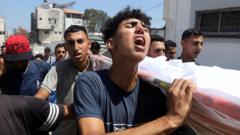In the Donetsk region of Ukraine, soldiers and civilians remain critical of Russia's announced ceasefire—intended to coincide with Victory Day—reporting ongoing attacks and voicing doubts about its sincerity. Ukrainian President Volodymyr Zelensky calls for a longer truce as soldiers share their daily realities, contrasting the government's diplomatic overtures with the harshness of life on the frontlines.
Ukrainian Perspectives on Russia's Ceasefire: Voices from the Frontlines

Ukrainian Perspectives on Russia's Ceasefire: Voices from the Frontlines
As Ukraine grapples with ongoing conflict, soldiers and civilians express skepticism about Russia's proposed ceasefire, highlighting continued violence and distrust.
Ukrainian military personnel and civilians in the Donetsk region express skepticism regarding Russia's recently proposed ceasefire, emphasizing a lack of trust in the adversary's intentions. Amid sounds of artillery and explosions, the soldiers articulate the grim reality of their situation, stating that they remain constantly prepared for warfare—even as diplomatic gestures unfold in the background.
The ceasefire, proposed by Russian President Vladimir Putin to mark the anniversary of the end of World War Two, had security implications that intensified the scrutiny of both military and civilian perspectives. According to 26-year-old soldier Max, the need for "tunnel vision" in combat leaves little room for negotiation talks, emphasizing a mindset geared toward survival as the immediate priority over ceasefire discussions.
Serhii, another soldier, recounted that Russian attacks continued even after the announcement of the ceasefire. “They can’t be trusted,” he said, illustrating the battlefield's chaotic nature where previous pledges for peace dissolve amidst ongoing attacks involving drones and glide bombs. He described the feeling of being on alert at all times, indicating that the supposed truce has not translated into any respite.
In contrast, the civilian experience shines through the accounts of those like Svitlana, who had to flee from Pokrovsk to the relative safety of Dobropillya. With ringing ears near explosions, she characterized the sound as symbolic of Russia's violation of the ceasefire, arguing that trust in their word is futile. Her sentiment is echoed by others in the bustling local markets, where the fear of escalated violence looms large.
In this fraught context, Ukrainian leadership is advocating for a more comprehensive 30-day truce, as urged by allies including the United States, although skepticism remains prevalent among soldiers and civilians alike. Oleksandr, a market vendor, expressed his apprehensions for family safety amid rising tensions, admitting despair and fear amid an uncertain future. Each account highlights an overarching narrative—a repeated sense of skepticism towards Russia's intentions, underscoring the complexities of ongoing diplomatic and military engagements in the conflict.





















